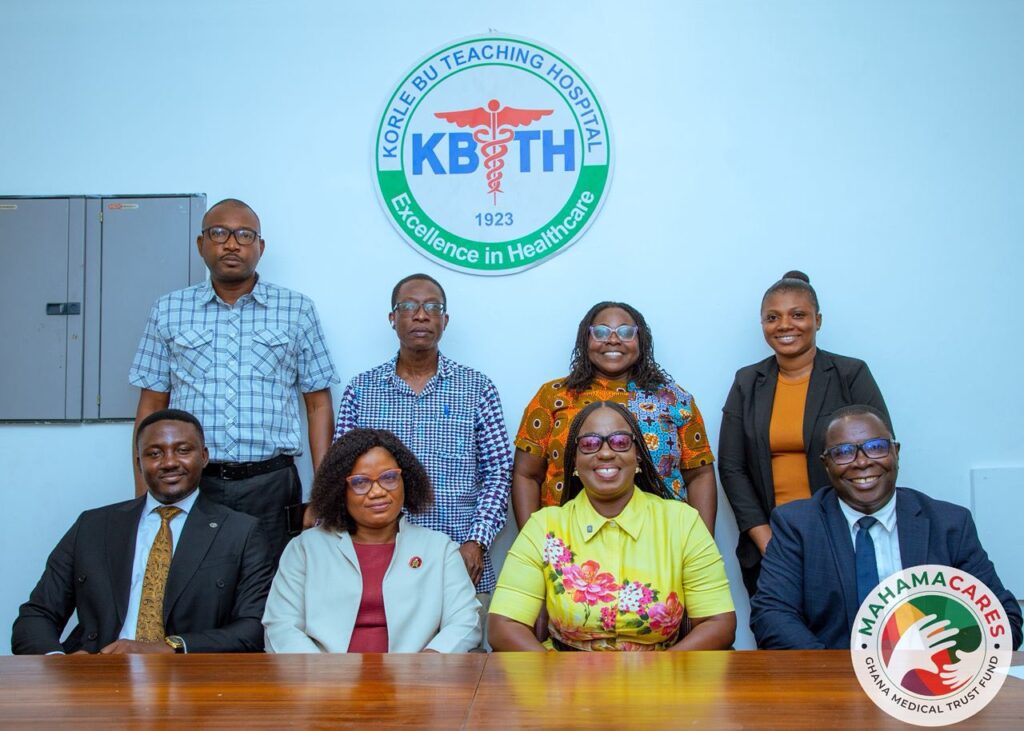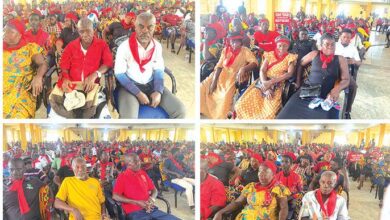MahamaCares Begins Assessment At Major Hospitals To Save Lives
...Amid Rising Cases of Diabetes, Stroke, Kidney Failure, Others

In response to the alarming rise in non-communicable diseases (NCDs) such as diabetes, stroke, kidney failure, cancer, and heart disease, the Ghana Medical Trust Fund—popularly known as MahamaCares has commenced a nationwide needs assessment exercise aimed at identifying critical gaps in the country’s healthcare system.
The initiative, led by the Fund’s Administrator, Madam Obuobia Darko-Opoku, began with visits to the Korle Bu Teaching Hospital and the Greater Accra Regional Hospital (Ridge Hospital).
The delegation engaged hospital management and frontline medical personnel to better understand challenges in NCD care and explore targeted interventions to improve outcomes.
Speaking during the visit, Madam Darko-Opoku explained that the assessment is crucial for gathering accurate data on NCD patients—including demographics, treatment outcomes, and financial burdens to inform policy and resource allocation.
“What we are supposed to be doing cannot be done by sitting at the Secretariat. It is important to go around, see what is happening, identify the gaps, and provide the needed support,” she stated.
Korle Bu’s Dual Role
At Korle Bu, the team was received by the Chief Executive Officer, Dr. Yakubu Seidu Adam, who commended the initiative and emphasized the hospital’s dual role as both a referral center and a hub for specialist training and redistribution across the country.

“While we handle complicated referral cases, many NCDs such as hypertension are managed at lower-level facilities. Your regional tour will help capture the true national picture,” Dr. Adam said.
Dr. Norbert Kipo, Technical Director of the Fund, stressed the urgent need to invest in modern diagnostic and treatment equipment, diversify dialysis infrastructure to avoid disruptions, and expand cancer care services nationwide.
“We must ensure modern medical care through reliable equipment. That means expanding diagnostic services, avoiding reliance on a single machine, and ensuring every region has the capacity to manage NCD cases effectively,” he explained.
WHO Ghana’s representative, Madam Adwoa Twum Barima, added that technological advancement is central to improving NCD outcomes.
However, she warned that Ghana’s healthcare system often neglects the servicing and maintenance of high-end medical equipment, undermining their effectiveness.
“Healthcare today is a technological challenge. Advanced countries have improved NCD care through accurate and timely diagnosis. We must adopt a holistic approach that includes service agreements for machines we procure,” she advised.
Consultant Paediatrician at Korle Bu, Dr. Frank Owusu Sekyere, shared preliminary data reflecting the growing NCD burden and pledged the hospital’s commitment to collaborating with the MahamaCares team to refine data and guide targeted interventions.
Ridge Highlights Gaps
At Ridge Hospital, the delegation was welcomed by Medical Director Dr. Leslie Issa Adam-Zakariah and members of the management team.
Discussions highlighted pressing challenges including human resource gaps in specialist care and severe deficits in essential diagnostic equipment such as CT scanners, MRI machines, fluoroscopy, and mammography units.
The absence of these tools forces the hospital to refer patients to external facilities for advanced diagnostic procedures, resulting in delays, fragmented care, and increased financial strain on patients and their families.
The meeting provided a platform for open dialogue on how the Ghana Medical Trust Fund can tailor its support to meet the specific needs of health facilities.
In her concluding remarks, Madam Darko-Opoku reaffirmed the Fund’s commitment to practical, solutions-driven healthcare investment. She emphasized that MahamaCares is focused not only on resource mobilization, but also on strengthening hospital infrastructure, supporting specialist training, and bridging critical service delivery gaps.
“Our goal is to strengthen healthcare systems and save lives across Ghana. We’re committed to providing tailored support that addresses the real issues on the ground,” she stated.
Next Steps
The MahamaCares needs assessment will extend to all ten regional hospitals and the country’s five teaching hospitals, before moving to district-level facilities. The findings will inform the Fund’s intervention strategy to tackle the growing threat of non-communicable diseases across Ghana.
The Ghana Medical Trust Fund was established to support public healthcare delivery through strategic investment in infrastructure, medical equipment, specialist training, research, and partnerships with local and international institutions.



